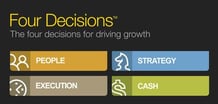 Several decades ago, three teachers in the San Francisco Bay Area were selected for a research project on teacher expectations.
Several decades ago, three teachers in the San Francisco Bay Area were selected for a research project on teacher expectations.
The school district called the 3 teachers prior to the school year and notified them of their part in a special project.
The teachers were told they had been selected because they were the very best in their school district. The 30 students they each were to teach this year would also be selected from the top students in their district. They were instructed, however, not to tell the students or parents know about this research project, so as not to influence the outcome. Naturally, with this selection process, they expected the students would perform very well.
When the school year was completed the students all scored in the high 80s to low 90s. These three classes of 30 students led their districts in academic achievement.
When they called the teachers in at the end of the year to inform them of their success, they were asked why they believed they had done so well.
The teachers all said it was because the students were so brilliant, it was easy to teach them, they responded so well, success was assured.
The teachers were then informed that the information they had been given at the start of the school year was not accurate. All students were chosen by lottery, completely at random.
The teachers were puzzled at first but then determined that it must have been due to their teaching prowess. After all, they were the best teachers in their district, their success must have been a consequence of their excellent teaching skills.
Once again the administration disappointed the teachers. Just as the students had been chosen by lottery, so had these three teachers been chosen at random.
Your Expectations Affect Your Team and Yourself
 Brain Tracy in the Psychology of Achievement noted, even though your expectations are unspoken they have a tremendous impact on how others behave toward you. Even though your expectations of what you are to achieve are unspoken, they have an impact on people’s behavior toward you. They change your personality, how you interact with people, your confidence.
Brain Tracy in the Psychology of Achievement noted, even though your expectations are unspoken they have a tremendous impact on how others behave toward you. Even though your expectations of what you are to achieve are unspoken, they have an impact on people’s behavior toward you. They change your personality, how you interact with people, your confidence.
Whoa Doug, are you saying my own behavior and expectations affect not only how I treat others, but how others treat me?
Yes! 100% unequivocally YES. It’s one of the reasons I am such a believer in responsibility!
I’ve always believed I’m 100% responsible for everything, everything that comes into my life. Accidents, cancer, the winning lottery ticket, failure in business, love, everything is in my control, unconsciously or consciously. It’s the unconscious portion of this that truly makes us blame others. Thoughts are things, and until we learn this, we will never be as successful as we desire to be.
Have you ever not liked someone? Something about them displeases you. Have you noticed this person also avoids or shuns you?
Laws of Mind
Tracy outlined three laws that govern most people:
- Locus of Control: Individual feels good about themselves to the degree they feel they are in control of their lives.
- The Law of Accident: Belief that everything happens by chance. In failing to plan they plan to fail. (This law is false BTW)
- Law of Cause and Effect: For every cause in our lives there is a specific effect. If we wish to change the effects in our lives we must change the causes. (This law by the way may not be entirely true, as I discovered with Quantum Theory.)
Thoughts are causes
Conditions are effects.
Thus the most important first moving force in everything that happens to us is our thoughts.
We are today nothing more than the sum total of all of our thinking to this date.
You are not what you think you are. But What you Think – You Are.
 Laws of Mind:
Laws of Mind:
- Law of Belief: What we believe becomes our reality. What we believe predetermines our reality. To the degree to which we believe it, it becomes true to us. IF WE BELIEVE WE ARE HELD BACK – WE ARE. IF WE WANT TO CHANGE OUR REALITY – FIRST CHANGE OUR BELIEF STRUCTURE
- Law of Expectation: What you expect becomes your own self-fulfilling prophecy. There are three areas of importance regarding Expectations:
- Expectations of our Parents / Employer
- Expectations of People who look up to you.
- Expectations of Yourself - You can tell what your own personal expectations are by listening to how you feel things are going to turn out.
If you expect to be successful you are continually aware of and are looking for opportunities that can increase your success. (The same is true for failure)
Applying these Laws
Why are these important, and especially why are these laws of expectation critical? If we are the sum total of our thought to date, what have your thoughts been?
What are your current thoughts about the people who work for you? Are you expecting they don’t know what you think of them? They do, consciously or unconsciously.
These principles are the reason you are where you are, and why your business is where it is.
Change your thoughts, and you change your reality.
My personal experience with cancer proves this.
Want better performance? Expect more! If you don’t believe the people you currently have can produce the outcome you expect: FREE UP THEIR FUTURE!
You both will be happier!
 Strategic Discipline and our Four Decisions Scaling Up coaching apply these principles with impunity. Choosing a priority, measuring results (metrics), and providing a cadence of accountability (Meeting Rhythms) demands the cream of your team will rise to the top. For help growing your organization, contact dwick@positioningsysetms.com
Strategic Discipline and our Four Decisions Scaling Up coaching apply these principles with impunity. Choosing a priority, measuring results (metrics), and providing a cadence of accountability (Meeting Rhythms) demands the cream of your team will rise to the top. For help growing your organization, contact dwick@positioningsysetms.com
Discover how your organization is currently doing: take the Four Decisions Needs Assessment now!
How Do You Measure Up – Four Decisions – Next Blog
Decisions Equal Success. Scaling Up by Verne Harnish shares Four Decisions every small to mid-size business needs to get right or risk leaving significant revenue, profits, and time on the table. These four decisions are People, Strategy, Execution(Strategic Discipline), and Cash. How does your business measure up? I’ll share our Four Decisions Needs Assessment and how you can score your business next blog.
every small to mid-size business needs to get right or risk leaving significant revenue, profits, and time on the table. These four decisions are People, Strategy, Execution(Strategic Discipline), and Cash. How does your business measure up? I’ll share our Four Decisions Needs Assessment and how you can score your business next blog.






.jpeg?width=150&height=135&name=Hand%20with%20marker%20writing%20the%20question%20Whats%20Next_%20(1).jpeg)

